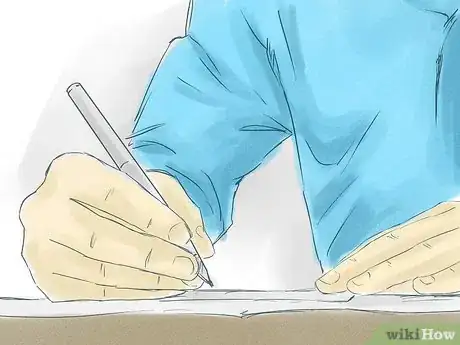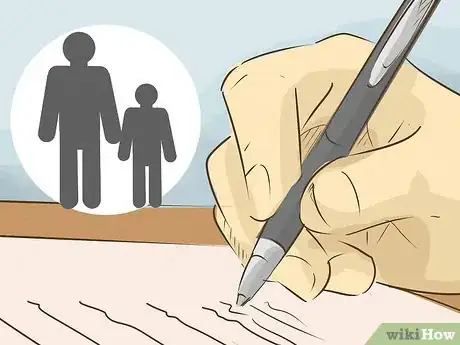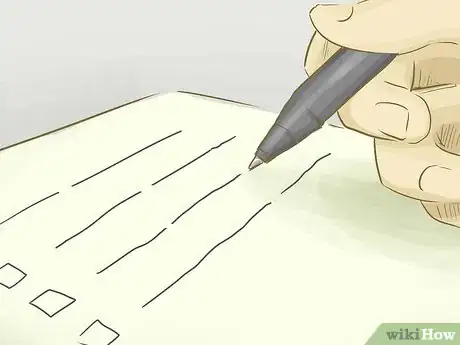X
This article was co-authored by Clinton M. Sandvick, JD, PhD. Clinton M. Sandvick worked as a civil litigator in California for over 7 years. He received his JD from the University of Wisconsin-Madison in 1998 and his PhD in American History from the University of Oregon in 2013.
There are 16 references cited in this article, which can be found at the bottom of the page.
This article has been viewed 18,632 times.
It's a sad thought, but you're going to die one day. When that happens, a relative may need to set up an estate to take care of expenses and distribute inherited property to the new owner(s). If you plan ahead, you'll save your heirs a great deal of stress and hassle.
Steps
Part 1
Part 1 of 2:
Preparing Your Estate
-
1Create a will to distribute your estate assets to whomever you desire.[1] If you don't have a plan, the government will handle it for you through a process called intestacy.[2] Intestacy rules within each state serve to approximate the intent of an average person dying without a plan for their possessions. That's a highly unscientific approach that can lead to fighting and an unfair distribution of your wealth. There are three ways to set up a will:
- Statutory Wills: These are public forms that only require you to fill in blanks about who is getting what. Because they are public, they are quickly accepted by courts of law, though not all states will have them.[3]
- Personal Wills: You can write your own will, though you need to be very specific about what is going where to avoid complications. You will need 2 witnesses to sign as well. There is also software that can help you write the will.[4]
- Working with a Lawyer: Your safest bet when writing a will is to hire a lawyer. They can answer questions, help avoid pitfalls, and defend your intentions after you die. Simple wills cost anywhere from a few hundred to a thousand dollars.[5]
-
2Name an executor. The executor is the person in charge of your estate after you've died. That's the person who will likely be in full control of your assets. The executor needs to be named in your will and you should consider assigning an alternate in case your first choice is unable to help. Talk to the person you have in mind before you die to make sure he or she is okay with the responsibility, then send the executor a sealed copy of the will when it is finished.
- Spouses are most commonly named executors, as they are familiar with the estate.
- Trusted friends and family members make good executors.
- If you do not name an executor one will be court appointed, which could lead to executor expenses for your family.[6]
Advertisement -
3Name guardians for children under the age of 18. To avoid dragging any minor children through the courts, it's best to name a guardian for minor children in the will. Make sure you talk to the person first to make sure he or she is okay with the potential responsibilities of caring for you children.
- You should similarly account for any of your pets.[7]
-
4Create an inventory, or account, of the estate for distribution to heirs. The inventory should contain a list of all of your debts and assets, the approximate value of each, whether the assets will pass directly to a new owner, and a total debt and asset value. The list may need to be formal, delivered to the heirs in a specific form or manner, and/or filed with the court. Check your state’s probate code or check with your attorney to determine if the inventory should be filed with the Court and how it should be distributed to the heirs. For now, simply create the list so you know what needs to be distributed in your will.
- Assets are anything that can be sold for money. Debts are bills, loans, or expenses that need to be paid after your death.
- The value of real estate listed on the inventory should be the most recently appraised value. Consult an attorney or a certified public accountant to determine if a formal appraisal is required in your state.
- Personal property values listed on the inventory are calculated based on current market value by agreement of the heirs, or appraisal of the personal property by a licensed appraiser.
-
5Decide how to pass down your assets. This is the major headache in a will, but it is incredibly important to prevent disputes after your death. Next to each asset listed, note who will receive the asset after your death. Make sure you are detailed and specific -- sometimes the biggest fights are over the smallest things, like a sentimental lamp or piece of jewelry.[8]
- You can also "lump" things together with phrases like "all of my furniture and household objects will be given to my son, Thomas Kitchener."
-
6Decide how your heirs should pay off your debts. Account for the money you still owe and make sure it can be paid without expense to your heirs. This may require selling off assets, such as noting to "sell my house and use the money to pay off any outstanding mortgage payments," or noting an account that should be used for payment, such as an unused retirement account.
-
7Create a backup plan within your will. Some things will, without a doubt, fall through the cracks as you plan your will. If you do not have something accounted for in your will then it will be up to the state to distribute it. The easiest way to avoid this is with a backup clause, something along the lines of: "all other assets will be placed in the care of my husband, Steven Johnson."
- Wills are commonly used as a backup to a trust fund, providing insurance and legal background in the case of a dispute.[9]
-
8Check the beneficiary lists of your retirement accounts. If you have any investment, retirement, or bank accounts that list who will receive the money in case of your death (beneficiaries), this name will take precedence over your will. Call the customer service team of each account and make sure your listed beneficiary is who you want it to be.[10]
- This applies to life insurance policies and annuities as well.
-
9Specify your end of life plans in case you cannot make your wishes known. A living will can assign a caretaker or decision-maker in the event you cannot make a decision due to mental or physical incapacitation. There are three main parts of end of life care documentation:
- Living Will: Outlines treatment you wish to receive or wish to forgo, and under which conditions.[11]
- Power of Attorney: Designates someone to make health-care choices for you when you are no longer able.[12]
- Letter of Instruction: Outlines specific end of life instructions, phone numbers and information for bank accounts or insurance, and basic instructions for your family after you've passed. This is not a replacement for a will, but can help in the days immediately after you pass.[13]
-
10Make your funeral arrangements in advance. Funerals are one of the largest single-sum expenses a family will ever pay, ranging from $4,000-6,000. Save your family the hassle by making arrangements ahead of time with a funeral parlor, or by writing down your burial wishes and a maximum cost. If you decide to pre-plan your funeral, make sure you sign a "fixed cost" agreement to prevent the funeral parlor from passing on unexpected costs to your relatives.
-
11Consider creating a trust to avoid public records. Wills are publicly filed documents that necessarily involve a court of law. Trusts, however, are private, allowing you to distribute your estate over time to whomever you chose. They are generally used for estates larger than half a million dollars, or to hold onto assets until a beneficiary (the person receiving the trust) comes of age. Setting up a living trust may help you distribute your assets without court interference.[14]
- A trustee is the person who holds on to your assets until they are ready to be passed on.
- Trusts allow you to put conditions on your gifts, such as "she inherits it after turning 18," or "only inheritable after all debts are paid."[15]
- You will likely need an estate lawyer to help you set up a trust fund.
Advertisement
Part 2
Part 2 of 2:
Distributing Your Estate
-
1Differentiate between supervised and unsupervised distribution. Depending on the size of your estate, you may be able to pass down your assets without interference from a court. However, many estates must go through the legal system for heirs to access the assets. The legal process of transferring money from a deceased account to living heirs is called probate.[16]
- The American Bar Association defines probate as "the process by which assets are gathered, applied to pay debts, taxes, and expenses of administration, and distributed to those designated as beneficiaries in the will.”
- Not all estates need to be probated -- there are times when the executor of the will can distribute the estate without court interference.
-
2Determine who will act as personal representative of the estate. The personal representative will be responsible for setting up and administering the estate. Executors and administrators are the formally appointed personal representatives of an estate and have been granted Court authority to act on behalf of the estate. More often than not, the executor has been named in the will.
- If the decedent (the person who has died) did not leave a will the family decides who to ask the Court to appoint as administrator(s). The Court may appoint one administrator who is authorized to act alone, two or more administrators who are required to act together, or two or more people authorized to act alone, depending upon the agreement the decedent’s family reaches.[17]
-
3Calculate the estimated value of the estate. Make a list of all the assets and debts in your estate. This includes property, cash, valuables (furniture, antiques, cars, etc.), investment or bank accounts, and debt. If it could be sold for money, it is an asset. You can also higher a professional appraiser to help determine the value of your estate.[18]
- Gather all financial documents including bills, bank and investment statements, and information on any outstanding loans.
- Add up all bills, including the payoff amount for any loans or credit cards.
- Add up the value of the estate assets, including the estimated value of all real estate. You may use the last appraised value of the real estate for estimation purposes.
- Subtract the total debt from the total assets. This is the estimated value of the probate estate.
-
4Determine with an estate lawyer whether or not you need to go through probate. Check your state’s probate code with your attorney to determine your legal responsibilities. An estate which contains assets above your state’s small estate limit, typically $20,000 to $100,000, will need to be probated. If the estate’s assets do not exceed your state’s small estate limit and there is no dispute about who inherits what, you may choose to administer the estate by informal administration, with little to no court involvement.
- If the estate’s assets do not exceed your state’s small estate limit, but if there is real estate involved you may be required to set up and administer the estate through the probate courts. Check your state’s probate code or with your attorney for your state’s rules governing small estates.
- If the estate’s assets do not exceed your state’s small estate limit, but there is any dispute as to whom should inherit property or pay estate debt, you may choose to probate the estate in order to have these issues decided by the Court.
- In informal administration, when the executor carries out the decedent's wishes, property may be transferred via an affidavit (written, court-confirmed statement) or through summary administration, bills paid by the family in almost any manner agreed upon, and no estate set up.[19]
-
5Determine which of your assets are part of the probate estate. The probate estate consists of all assets which do not pass directly to a new owner. All of these assets must go through a probate court before they are passed on. Assets pass directly to a new owner and skip probate if:
- They are jointly titled with another party, such as joint bank accounts or vehicles, which list a co-owner on the title.
- They are named as a transfer on death beneficiary. A transfer on death beneficiary can be designated on financial accounts, vehicles, and, in some states, real estate. Transfer on death beneficiaries will be listed on the title or deed to the account, vehicle, or property if one has been named.
- They are named as a beneficiary. A pay on death beneficiary can be designated on financial accounts and life insurance policies. Pay on death beneficiaries are listed on the account or policy if one has been named.[20]
Advertisement
Warnings
- The laws governing estates differ from state to state and can change very quickly. You should consult a legal or tax professional for important rules regarding setting up an estate in your county and state.⧼thumbs_response⧽
Advertisement
References
- ↑ http://www.nolo.com/legal-encyclopedia/what-is-will.html
- ↑ https://www.law.cornell.edu/wex/intestacy
- ↑ http://www.legalmatch.com/law-library/article/what-is-a-statutory-will.html
- ↑ http://www.nolo.com/legal-encyclopedia/how-write-will.html
- ↑ http://info.legalzoom.com/much-cost-write-will-4003.html
- ↑ http://www.free-legal-document.com/how-to-write-a-will.html
- ↑ http://www.nolo.com/legal-encyclopedia/how-write-will.html
- ↑ http://www.alllaw.com/articles/wills_and_trusts/planning-estate-ten-things.htm
- ↑ http://www.nolo.com/legal-encyclopedia/how-write-will.html
- ↑ http://www.investopedia.com/articles/retirement/10/estate-planning-checklist.asp
- ↑ http://www.alllaw.com/articles/wills_and_trusts/article7.asp
- ↑ http://www.caregiverslibrary.org/caregivers-resources/grp-legal-matters/hsgrp-power-of-attorney-guardianship/what-is-power-of-attorney-article.aspx
- ↑ http://www.aarp.org/relationships/caregiving/info-09-2010/legal_documents_women_long_term_care.html
- ↑ http://www.alllaw.com/articles/wills_and_trusts/planning-estate-ten-things.htm
- ↑ http://www.alllaw.com/articles/wills_and_trusts/planning-estate-ten-things.htm
- ↑ http://www.nolo.com/legal-encyclopedia/probate-faq-29135.html
- ↑ http://www.nolo.com/legal-encyclopedia/if-there-s-no-will-who-s-the-executor.html
- ↑ https://www.gov.uk/valuing-estate-of-someone-who-died/overview
- ↑ http://www.gerstnerlaw.com/images/docs/What%20Every%20Executor%202-06-09.pdf
- ↑ http://www.scscourt.org/self_help/probate/property/probate_overview.shtml
About This Article
Advertisement







































































